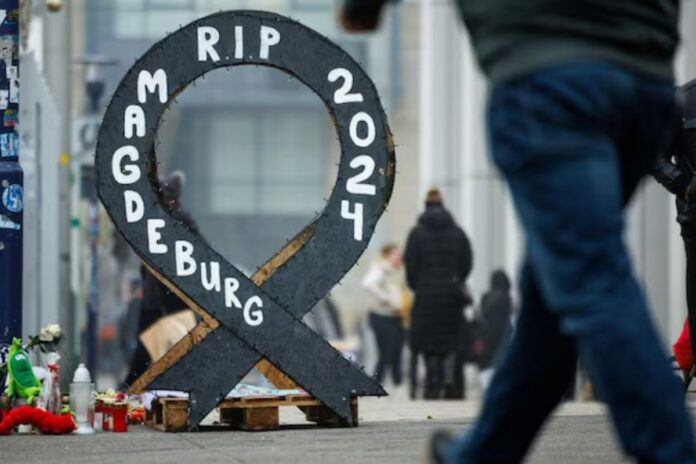German security chiefs are set to face intense questioning over the December 20 car-ramming attack at a Christmas market in Magdeburg, which resulted in five deaths and over 200 injuries. The suspect, 50-year-old Saudi psychiatrist Taleb al-Abdulmohsen, was apprehended at the scene, and authorities are under scrutiny regarding potential security lapses that allowed the tragedy to unfold. The incident, involving a rented BMW SUV, saw Abdulmohsen drive at high speed through a crowd of market-goers, leaving behind a scene of bloody devastation.
The attack in Magdeburg, located in eastern Germany, has prompted questions about the handling of information regarding Abdulmohsen, who had previously been known to authorities. Investigators are still trying to determine the motive behind the attack, though the use of a vehicle as a weapon has drawn comparisons to past terrorist assaults, such as the 2016 attacks in Berlin and Nice. The Saudi psychiatrist’s known anti-Islam views and sympathies with far-right ideologies complicate the situation, raising questions about whether the attack was an act of terrorism or a result of personal grievances.
Abdulmohsen, who was previously treated for mental illness and reportedly tested positive for drugs at the time of his arrest, remains in custody on charges of murder and attempted murder. Despite evidence of his past threats and history with the law, the authorities have not yet charged him with terrorism-related offenses. This has fueled concerns about missed warning signs and potential failures in Germany’s security systems.
Repeated Warnings and Authorities’ Missed Opportunities
In the days following the attack, it was revealed that German authorities had been made aware of Abdulmohsen’s potential threat on multiple occasions. Reports indicated that Saudi Arabia had warned Germany about the suspect on several occasions, and there were also claims that the kingdom had requested his extradition. However, German authorities have not commented publicly on these reports, and it is unlikely that they would have sent Abdulmohsen back to Saudi Arabia due to his refugee status in Germany.
Authorities had reportedly attempted to contact Abdulmohsen in both September and October of 2023 and had planned additional meetings in December. These meetings are typically held to inform individuals deemed as potential threats that they are under surveillance, but the attempts to engage him were unsuccessful. This raises important questions about whether more proactive measures could have been taken, potentially preventing the tragedy.
A Dark Past and Troubling Social Media Activity
Abdulmohsen’s history, coupled with his social media presence, paints a disturbing picture. German media outlets have uncovered a trail of violent rhetoric, including threats against German citizens and politicians. His anti-Islam sentiments, combined with his extremist views, have drawn comparisons to the motivations behind past acts of political violence. Investigators are now looking into whether his past behavior and online activity were sufficient grounds for more intense scrutiny.
Abdulmohsen first arrived in Germany in 2006, and after a decade, he was granted refugee status. Despite this, his frustrations with Germany’s immigration policies seem to have festered over time, contributing to his eventual violent outburst. His online posts and actions have raised alarm bells among some segments of the population, leading to calls for stronger measures to deal with individuals espousing far-right extremism.
German Chancellor Calls for Full Investigation into Security Failures
Chancellor Olaf Scholz has emphasized the need for a comprehensive investigation to determine whether the attack could have been prevented. With elections approaching in February, the incident has reignited debates over immigration and security within Germany. Scholz stated that “no stone must be left unturned” in examining the failures leading up to the attack. His comments reflect a broader national concern about the country’s approach to security and the risks posed by individuals who may slip through the cracks in the system.
The Christmas market attack has become a flashpoint in Germany’s ongoing political debates, particularly in the context of rising tensions surrounding immigration policies and security threats. Critics, including conservative opposition leader Friedrich Merz, have argued that the attack underscores the dangers of allowing extremists, regardless of their ideology, to operate within the country. Merz called for immediate action, warning that “conflicts are being fought out on German soil” and urging the government to take stronger steps to prevent such attacks in the future.
The Aftermath and Impact on German Politics
As the investigation unfolds, the impact of the attack continues to ripple through German politics. Questions regarding the balance between security and immigration policies are now at the forefront of public debate. As the government prepares for elections, the tragic event has added urgency to the ongoing discussions about how best to address these sensitive issues.
The questioning of German security chiefs marks a critical moment in the search for answers, as both the public and authorities await clarity on whether this tragedy could have been avoided. The road ahead will likely involve tough questions and calls for reform as Germany confronts the challenges of keeping its citizens safe while managing complex immigration issues.

